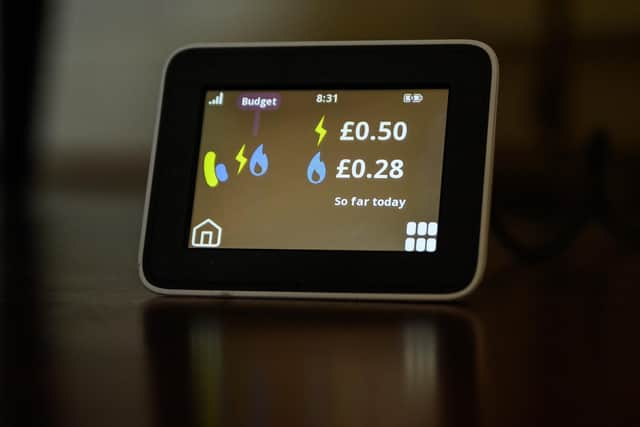Cost of Living Crisis: What is the new October energy price cap for typical use tariffs, how much may my bills go up by, can the prices eventually go down, what help can I get and what if I refuse to pay?
and live on Freeview channel 276
The regulator changes the price cap every three months, and the new price for average use tariffs has been announced.
Previously, this change would be made every six months, but Ofgem made the switch in an attempt to help suppliers manage risk.
Advertisement
Hide AdAdvertisement
Hide AdThis was a move derided by financial experts such as Martin Lewis.
A high wholesale price of gas is leading to energy companies passing on higher costs to the consumer.
The Russian-Ukrainian conflict and other factors are being blamed for the increase.


Advertisement
Hide AdAdvertisement
Hide AdHere is everything you need to know about the October price cap:
What is a price cap?
The energy price cap is the maximum amount a utility company can charge customers in the UK per year for their electricity and gas bills.
It limits what firms can charge customers for being connected to the grid, known as the standing charge.
Ofgem sets the maximum price firms can charge per unit of gas and electricity.
The unit measurement is a kilo-watt per hour.
Advertisement
Hide AdAdvertisement
Hide AdCustomers on a standard variable tariff (SVT) are affected by the cap, while others are not.
This is usually an energy providers most expensive tariff.
How high may my bills go up?
The new price cap for those on average use tariffs – paying by direct debit – is £3,549.
This is a rise of 80 per cent.
It will come into effect on October 1, and will affect 24 million households across the UK.
SEE ALSO: Portsmouth neighbourhoods set to be worst impacted by energy crisis when price cap rises in October
Energy management consultants Cornwall Insight expect further increases in January.
They predict a further rise of £5,386 a year.
Advertisement
Hide AdAdvertisement
Hide AdPrices are now expected to put many people into fuel poverty.
E.on reported that one in eight households are struggling to pay their bills, which could increase further when the new cap kicks in.
There is no cap on the amount customers can pay.
Can the cap go down?
The last time the cap changed was on April 1.
It set the cost of a typical energy bill at £1,971 a year – a 54 per cent rise from the previous cap of £1,277.
That figure was based on an average-consumption household with an SVT, paying by direct debit.
Advertisement
Hide AdAdvertisement
Hide AdPeople on payment meters saw their prices rise from £1,309 to £2,017 a year, on typical usage.
Ofgem base the price cap on ‘market conditions’, meaning they can rise as well as fall.
A statement on their website said: ‘While the price cap will have to rise, it continues to remove the risk of prices rising quickly for consumers when wholesale prices go up but falling slowly and less fully when they go down.
‘When wholesale prices fall, these reductions will be passed on in full to customers through a lower price cap. This will happen more quickly with the quarterly price cap.
Advertisement
Hide AdAdvertisement
Hide Ad‘Ultimately energy has to be paid for in full and the price cap has to reflect the costs to the supplier of buying it wholesale and supplying it to homes, which makes up most of people’s bills.
‘The price cap is also not a cap on the maximum bill a household can be charged, which is based on their usage.’
SEE ALSO: How to take a meter reading
‘That rise alone swallows up not just £400 help for all homes, but even the £1,200 for the poorest. This will leave many destitute.’
What help can I get?
People are advised to contact their energy supplier immediately if they are struggling to pay their bills.
Advertisement
Hide AdAdvertisement
Hide AdThese companies run hardship funds designed to support people.
The government has announced they will be giving people a grant of £400 to cope with the soaring costs.
More than eight million lower income households will be offered a further £650 benefit.
Further payments include a £300 for pensioners, and £150 for disabled people.
Advertisement
Hide AdAdvertisement
Hide AdPeople can make claims through the government’s Household Support Fund and Warm Home Discount Scheme.
What if I refuse to pay my bills?
Choosing not to pay your energy bills may lead to severe consequences.
Firstly, it can affect your credit score, making it harder to secure finance and loans in the future.
Energy suppliers have to give people a chance to clear your debt on a prepayment plan.
Advertisement
Hide AdAdvertisement
Hide AdCompanies can force customers to move onto a pre-payment meter, or be threatened with disconnection.
Reaction
Money saving expert Martin Lewis has described the new cap as ‘hideous’.
He said on Twitter: ‘Today's 80% rise is hideous but NOT a surprise.
‘On @itvMLshow in March I first said "the Oct price cap may be over £3,000".
Advertisement
Hide AdAdvertisement
Hide Ad‘The rise is typically £750/yr more than help measures in May were based on.
‘The real shock is this announcement's happened without firm new help in place.’
Should I take a meter reading?
Taking a reading and informing your energy supplier of the results shows them how much gas and electricity you are using.
Martin Lewis and other money saving figures have urged people to follow this advice.
Advertisement
Hide AdAdvertisement
Hide AdThe aim is to avoid being charged on an projection basis, rather than what you are actually using.
Energy costs may increase regardless, they will be more accurate than estimated statistics.
More information about meter readings can be found here.
